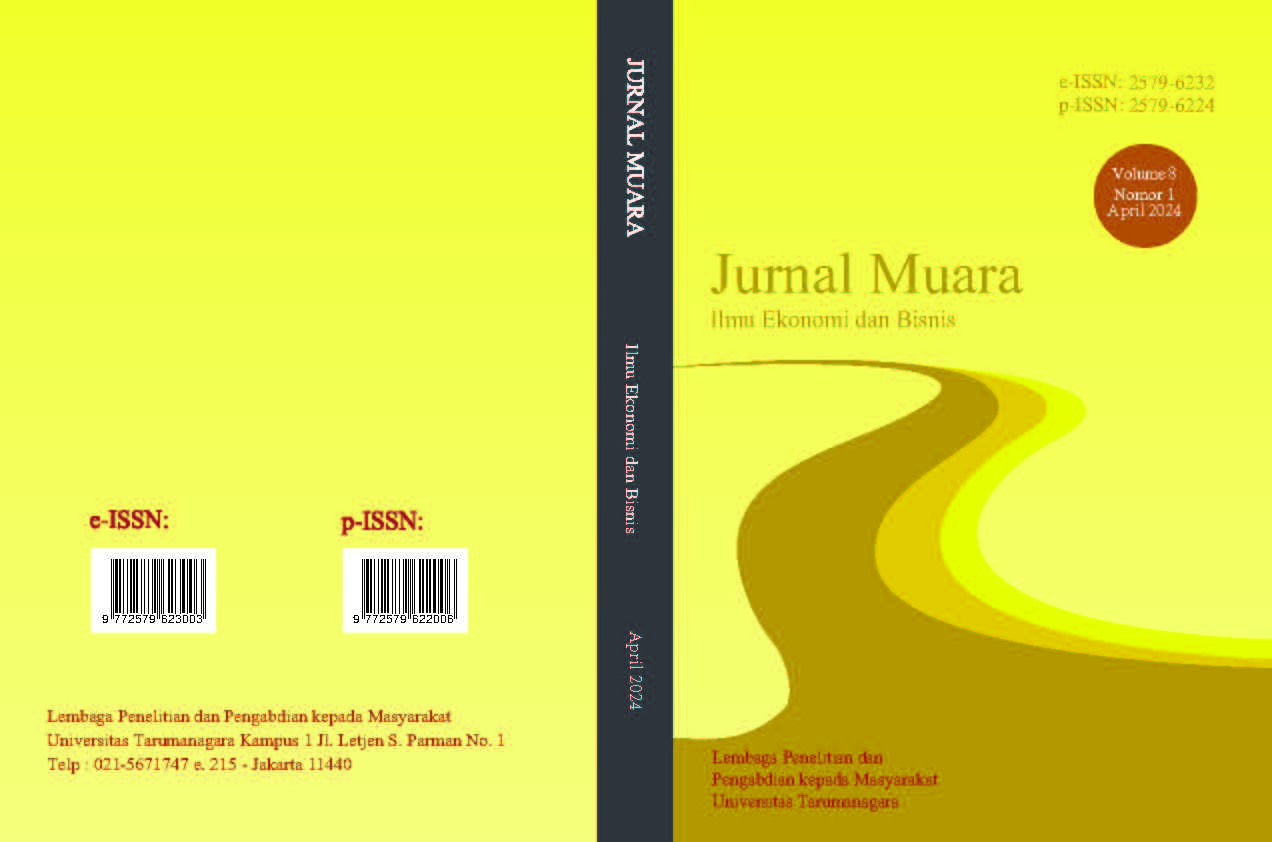FAKTOR YANG MEMPENGARUHI VISIT INTENTION DENGAN TRUST SEBAGAI MEDIASI PADA HOTEL RAMAH LINGKUNGAN
Main Article Content
Abstract
Berdasarkan data yang diperoleh dalam survey pendahuluan oleh penulis, niat masyarakat untuk berkunjung ke hotel ramah lingkungan tergolong sedikit. Hal ini dikarenakan berbagai faktor mulai dari lingkungan, persepsi serta kepercayaan akan sebuah kebiasaan yang baru pada diri konsumen. Penelitian ini bertujuan untuk menguji Perceived Environmental Knowledge, Environmental Concern dan Trust dalam mempengaruhi Visit Intention pada hotel ramah lingkungan di Indonesia. Sampel pada penelitian ini terdiri atas 211 responden yang dipilih melalui metode Purposive Sampling. Pengolahan data dilakukan menggunakan software Smart PLS 4. Hasil penelitian menunjukkan bahwa variabel Perceived Environmental Knowledge dan Trust memiliki pengaruh positif dan signifikan pada Visit Intention hotel ramah lingkungan. Environmental Concern tidak terbukti memiliki pengaruh positif signifikan pada Visit Intention hotel ramah lingkungan. Penelitian ini memiliki implikasi manajerial yang dapat bermanfaat bagi pengelola hotel ramah lingkungan di Indonesia. Selain itu, implikasi teoretis dari penelitian ini menyumbang kontribusi pada bidang ilmu pemasaran destinasi, khususnya pada topik manajemen perhotelan.
Based on data obtained in a preliminary survey by the author, people's intention to visit environmentally friendly hotels is relatively small. This is due to various factors ranging from the environment, perception and trust in a new habit in consumers. This study aims to examine Perceived Environmental Knowledge, Environmental Concern and Trust in influencing Visit Intention in eco-friendly hotels in Indonesia. The sample in this study consisted of 211 respondents selected through the Purposive Sampling method. Data processing is carried out using Smart PLS 4 software. The results showed that the variables of Perceived Environmental Knowledge and Trust had a positive and significant influence on the Visit Intention of environmentally friendly hotels. Environmental Concern has not been shown to have a significant positive influence on the Visit Intention of eco-friendly hotels. This research has managerial implications that can be useful for green hotel managers in Indonesia. In addition, the theoretical implications of this research contribute to the field of destination marketing science, especially on the topic of hospitality management.
Article Details

This work is licensed under a Creative Commons Attribution-NonCommercial-ShareAlike 4.0 International License.
This work is licensed under a Jurnal Muara Ilmu Ekonomi dan Bisnis Creative Commons Attribution-ShareAlike 4.0 International License.References
Adetola, O. J., Aghazadeh, S., & Abdullahi, M. (2021). Perceived environmental concern, knowledge, and intention to visit green hotels: do perceived consumption values matter?. Pakistan Journal of Commerce and Social Sciences (PJCSS), 15(2), 240-264.Retrieved from https://www.econstor.eu/handle/10419/237077
Ajzen, I. (1991). The theory of planned behavior. Organizational behavior and human decision processes, 50(2), 179-211. Doi :https://doi.org/10.1016/0749-5978(91)90020-T
Asdhiana, I.M. (2016, April 21). Pariwisata Jateng, Potensi Besar, tetapi Pertumbuhan Ekonomi Rendah. Kompas Online. Diakses dari http://www.travelkompas.com
Chairy, C., Tunjungsari, H. K., Selamat, F., Wijaya, S. M., & Velen, V. (2022). Pengembangan Motif Batik Untuk Meningkatkan Awareness Wisatawan Pada Tanjung Lesung. Jurnal Muara Ilmu Ekonomi dan Bisnis, 6(2), 372-379. Doi : https://doi.org/10.24912/jmieb.v6i2.20465
Chairy, C., & Alam, M. E. N. (2019). The influence of environmental concern, green perceived knowledge, and green trust on green purchase intention. Jurnal Manajemen (Edisi Elektronik), 10(2), 131-145. Doi : https://doi.org/10.32832/jm-uika.v10i2.2431
Christianto, J., Amalia. A., Furqan. A. (2023). Green Hotels Development Policy As A Low Carbon Tourism Development Effort In Indonesia. International Journal of Sustainable Competitiveness in Tourism 2 (1), 12-24. Doi : 10.34013/ijscot.v2i01.1048
Jian, Y., Yu, I. Y., Yang, M. X., & Zeng, K. J. (2020). The impacts of fear and uncertainty of COVID-19 on environmental concerns, brand trust, and behavioral intentions toward green hotels. Sustainability, 12(20), 8688. Doi : https://doi.org/10.3390/su12208688
Patwary, A. K., Rasoolimanesh, S. M., Rabiul, M. K., Aziz, R. C., & Hanafiah, M. H. (2022). Linking environmental knowledge, environmental responsibility, altruism, and intention toward green hotels through ecocentric and anthropocentric attitudes.
International Journal of Contemporary Hospitality Management, 34(12), 4653-4673.https://doi.org/10.1080/10548408.2018.1490234
Saputra, I. P. E. R. (2017). Penerapan Life Cycle Energy Analysis (LCEA) untuk Mengurangi Dampak Lingkungan dari Konsumsi Energi di Hotel Alila Manggis (Doctoral dissertation, Institut Teknologi Sepuluh Nopember). Retrived From : https://repository.its.ac.id/46569/
Sudarsono, W., Abdillah, F., Nurtiah, N., & Pradana, E. A. (2023). Building Visit Intention to Local Destination Panorama Pabangbon through Electronic Word-of-mouth (eWOM) and Visitors’ Trust. ProBisnis: Jurnal Manajemen, 14(4), 34-39. Retrived from : https://www.ejournal.joninstitute.org/index.php/ProBisnis/article/view/186
Sultana, N., Amin, S., Islam,A. (2021). Influence of perceived environmental knowledge and environmental concern on customers’ green hotel visit intention: mediating role of green trust. Asia-Pacific Journal of Business Administration 14 (2). Doi : https://doi.org/10.1108/APJBA-08-2021-0421
Vincent, C. T. (2018). Amateur versus professional online reviews: Impact on tourists' intention to visit a destination. Tourism: An International Interdisciplinary Journal, 66(1), 35-51. Retrieved From : https://hrcak.srce.hr/clanak/290748
Vinoth, S. (2023). Green Loyalty: The Mediating Role Of Green Trust And The Effects Of Environmental Concern, Environmental Advertising, And Environmental Knowledge. The Online Journal of Distance Education and e-Learning, 6(2). Retrieved From : https://tojdel.net/journals/tojdel/articles/v11i02b/v11i02b-58.pdf
Wang, S., Wang, J., Wang, Y., Yan, J., & Li, J. (2018). Environmental knowledge and consumers’ intentions to visit green hotels: The mediating role of consumption values. Journal of Travel & Tourism Marketing, 35(9), 1261-1271. https://doi.org/10.1080/10548408.2018.14902
Wang, S., Wang, J., Li, J., & Zhou, K. (2020). How and when does religiosity contribute to tourists’ intention to behave pro-environmentally in hotels?. Journal of Sustainable Tourism, 28(8), 1120-1137.doi: https://doi.org/10.1080/09669582.2020.1724122
Wang, J., Wang, S., Wang, Y., Li, J., & Zhao, D. (2018). Extending the theory of planned behavior to understand consumers’ intentions to visit green hotels in the Chinese context. International Journal of Contemporary Hospitality Management, 30(8), 2810-2825.doi : https://doi.org/10.1108/IJCHM-04-2017-0223






